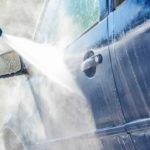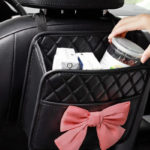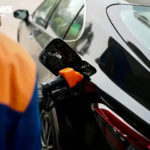Brake unnecessarily
To ensure safety while driving, many people often keep their foot on the brake pedal and sometimes lightly press it to be able to apply full force whenever necessary. Of course, the main purpose of the brake is to slow down and stop the car, but keeping the foot on the brake pedal and especially braking while the car is accelerating is not a good habit.
Pressing down on the brake pedal, even just a little, causes unnecessary wear on the brake pad, brake disc, or drum. The brake pedal and accelerator should not be operated simultaneously because pressing the brake pedal while the rotor is spinning at full throttle overheats the brakes, thereby reducing their stopping power. Maintaining the habit of constantly lightly pressing the brake pedal when it is not necessary can increase the risk of sudden brake failure while moving on the road.
Overloading
Nowadays, one of the important criteria when choosing a car for consumers is the trunk space. When owning a car, many people want to maximize the storage capacity of the trunk to hold clothes, sports equipment, camping gear, and so on. Sometimes, the car trunk is like a mobile warehouse for some people. Every car has a specific load limit, whether in the trunk or in the back seats.
If the owner exceeds that limit by carrying too much stuff, it can affect other functions of the car. Of course, carrying more stuff means the car will consume fuel faster and the result is a decrease in fuel efficiency. The excessive weight can also put additional stress on the tires, suspension system, and gearbox of the car, increasing the possibility of mechanical damage.
Speeding over speed bumps

Speed bumps on the road are designed to gently impact the vehicles in traffic to warn the driver to reduce speed to ensure safety, usually in crowded residential areas.
However, many drivers do not see this as a warning to slow down but instead treat them as obstacles to accelerate through rather than reduce the throttle to slow down. Even if ignoring the risk of collision with vehicles and pedestrians, this practice also does not good for the suspension system of the car. Although inadvertently hitting the speed bumps is not a big problem, continuously hitting the speed bumps at maximum speed will put the car’s shock absorber system under constant stress.
A normal car is not supposed to bounce off the road like that, so a sudden strong impact, whether hitting a speed bump or when landing, can cause the car’s suspension to bend or leak. Moreover, this can also lead to damage to the steering and exhaust systems. In addition, similar issues can occur when hitting potholes at maximum speed, so drive carefully and avoid unnecessary high-speed collisions with obstacles.
Let the fuel tank run dry
Many people usually have the habit of letting the fuel level get very low before going to the gas station. However, this is not advisable, not only because you might have to stop the car in the middle of the road without fuel, but regularly letting the fuel level run low also affects the car’s performance. The car’s fuel injection system relies on a certain level of fuel to maintain pressure.
When there is little or no fuel in the tank, the amount of fuel injected will be much more difficult, causing the fuel pump system to be stressed and overheated. In addition, if you force the fuel hose to be drawn out from the bottom of the tank, you may get clogged with small metal pieces that settle at the bottom. To avoid these potential damages to your car, it is best to always keep at least a quarter of the fuel tank reserved.
Ignore the handbrake
There is a common misconception that the parking/emergency brake on your car only needs to be engaged when your car is parked on an inclined surface (and in cases where the regular brakes don’t work). When parking on a flat surface, many drivers will simply put the gear in the park position and leave it there.
However, even when parking in a completely flat place, you still need to always engage the handbrake. When you put the gear in the park position, a small latch called the parking pawl locks the gears of the gearbox in place. If you don’t engage the handbrake, the entire weight of the car will be exerted on this small metal latch, which is not good for it. Applying the handbrake will reduce the pressure and lock the wheels, ensuring that the car cannot roll when unattended. Additionally, your parking brake can also start to corrode and seize if not regularly used.
According to VOV





































